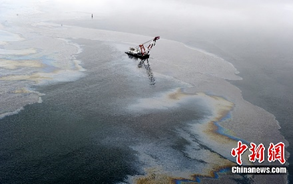1.The definition:
Marine oil pollution refers to the accumulation of oil and its degradation products in the marine ecosystem caused by tanker leakage, oil well eruption and waste oil discharge in the process of human exploitation, transportation and use of oil. Causing serious harm to marine life, water body, sand beach, etc.
2.The reason:
While oil is considered the main power energy source of modern industrial society and often referred to as the “blood” of the industry, the increased demand for oil has led to an increase in oil pollution caused by oil and its refinery products (gasoline, kerosene, diesel, etc.) entering the marine environment during extraction, transportation, refining, storage, and use. This is particularly true with oil spills at sea.
3. The damages:
(1). Once oil enters the ocean, it undergoes various processes such as evaporation, dissolution, dispersion, photo-oxidative degradation, emulsification, biodegradation, adsorption, sedimentation, which result in the release of hydrocarbons and trace metals (TMs) into the seawater. While hydrocarbons can be readily degraded by photo-oxidation, TMs are persistent and have cumulative toxicity, which means they can cause long-term damage to marine ecosystems.
(2). Oil pollution can inhibit photosynthesis, reduce the content of O2 in seawater, destroy the normal physiological function of organisms, and make fishery resources decline gradually. In the polluted waters, the poor quality of the water makes the breeding objects die a lot. The ones that survived were also smelly because they contained petroleum contaminants, making them inedible.
(3). The oil film formed on the sea surface can hinder the gas exchange between the atmosphere and the sea water, and affect the absorption, transmission and reflection of electromagnetic radiation on the sea surface. Oil films covering the polar ice surface for a long time will increase the heat absorption capacity of the ice and accelerate the ice melting, which will have a potential impact on global sea level change and long-term climate change.




4. The governance measures
(1). Preventive measures Prevention is one of the most effective prevention and control methods, including the following aspects:
a. Strengthening monitoring and control The establishment of a sound monitoring system for offshore oil exploration, transportation and processing links for real-time monitoring. At the same time, the supervision of oil tankers, oil platforms and offshore oil loading facilities will be strengthened to ensure that they meet safety standards. In addition, it is also necessary to formulate strict emergency plans for oil pollution and prepare for oil pollution prevention and control in advance.
b. Strengthening Safety management Increase investment, improve the safety performance of offshore oil exploration and transportation facilities, strengthen training and education, and ensure that operators have the necessary safety knowledge and skills. In addition, it will strengthen cooperation with international organizations to jointly formulate and implement relevant safety norms and norms to promote the safe development of the global offshore oil industry.
(2). Emergency measures After the occurrence of Marine oil pollution accidents, it is necessary to take rapid emergency measures to reduce losses and impacts. The main measures include:
a. Oil pollution removal the use of artificial adsorbents and biological adsorbents and other technologies to remove oil pollution. In addition, physical methods such as containment, isolation and centralized removal can be used to restore stability to Marine ecosystems as quickly as possible.
b. Rescue of Contaminated organisms Rescue of Marine organisms contaminated by oil shall be carried out in a timely manner. For example, injured animals are sent to specialized rescue centers, and treated and rehabilitated to minimize the death and injury of organisms. c. Strengthening monitoring and assessment In the process of emergency response, it is necessary to carry out comprehensive monitoring and assessment work, timely understand the scope and extent of oil pollution spread, predict the possible impact, and take appropriate measures according to the assessment results.